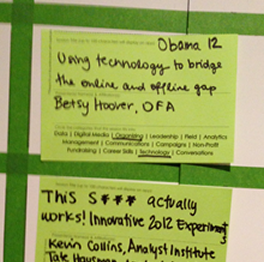In a new, numbers-based world, progressive conferees at RootsCamp see lucrative work for wise men drying up. How fast will conservatives catch up?
Nancy Scola
With campaign post-mortems heavily focused on the data wizardry that delivered Democratic victories, progressive organizers -- including from the Obama campaign -- say that campaigns based on numbers, testing, and best practices may spell the demise of know-it-all political consultants.
The argument: In the years since Howard Dean's quick rise and quicker fall, the left has embraced a model of campaign that's fueled by data, empowered supporters, and the sort of open-source information sharing that happened at the seventh annual RootsCamp conference in Washington, D.C., last week. And that, they say, is making Democrats felicitously less dependent than Republicans on political "gurus" in the Karl Rove mold, prized for generations on both sides of the aisle for the political wisdom kept locked away in their brains.
Along with that comes a change in the economics of Democratic politics. "No person in D.C. gets a percentage from volunteer field," said Becky Bond,
president of Credo SuperPAC, referring to the door knocking, phone banking, voter registration and other electioneering tasks delegated to unpaid campaign volunteers. "Volunteer field isn't going to buy the summer house." Bond spoke at a press briefing on the eve of RootsCamp featuring field organizers, data wranglers, and digital strategists from Obama for America, the AFL-CIO, Arizona's Adios Arpaio campaign, Marylanders for Marriage Equality, and other organizations, many of them trained over the years by RootsCamp host the New Organizing Institute. Bond and others described campaigns increasingly run by a generation of political professionals steeped in the practice of hands-on, metrics-focused, distributed campaigning.
"Those are the campaigns that we believe in and we run, and you don't make a lot of money off those types of campaigns," Bond said.

With campaigns functioning as the equivalents of businesses that shut down shortly after Election Day, win or lose, much of what's been learned on campaigns has traditionally been lost, said Daniel Mintz, campaign director at MoveOn.org. But the left has developed organizations -- the New Organizing Institute, MoveOn, and a newly, if arguably, functional Democratic National Committee -- that are acting as keepers of institutional knowledge between elections. One practical effect is that there is a corps of progressive staffers and volunteers "poised and ready to pounce" on the next campaign, said Betsy Hoover, director of digital organizing for the Obama campaign.
Progressives at RootsCamp conceded that not every Democratic candidate or issue campaign on the left has gone all in on the tech-savvy model popularized by Obama. But they describe witnessing early signs of a cultural shift, in part driven the accountability baked into metrics. Democrats' focus on not only capturing online and offline data but testing it aggressively has, on occasion, begun to replace the general consultant's gut instinct on campaign decisions. There's an emerging data clique at events like RootsCamp that hangs out together and shares ideas, so that it's not unusual to overhear casual comments like, "The analytics people are getting together for happy hour at the pub up the street..."
Another sign: In the early days of the Obama 2012 campaign, senior staff tried to instill new technology hires with the sense that they shouldn't expect to feather their own nests while in Chicago. In June of last year, emails went out to Obama supporters that the campaign had identified as having tech or creative abilities. The notes raised the possibility of jobs on the reelection bid whether or not they had any political experience. "You're one of very few people receiving this email because, based on what you've told the Obama organization in the past," senior digital strategist Joe Rospars wrote in one such email, "we think you might know someone who should quit his or her job and come work on the Obama campaign's digital team for the next 18 months." But the pitch continued: "It won't pay very well. The hours are terrible .... Most people who come to work here will take a pay cut." A postscript even asked for money. "It should go without saying that your gift obviously won't help your or anyone else's application specifically, but if you care about getting campaign up and running you really should make a donation now," Rospars wrote.
Carol Davidsen, a former Microsoft employee, got a similar email. She joined the campaign, in part to create The Optimizer, a project that blended voter demographic data and network ad rates to reveal which TV commercial spaces the Obama campaign should buy, a task traditionally left to ad consultants. "Targeting works," Davidsen told me recently.
There was evident glee at RootsCamp over what's seen as Romney and Republican's poor performance when it comes to technology, data, and field operations. But there are also signs of considerable and growing restiveness over it on the professional right.
In a blog post on
RedState this week, conservative commentator and activist Erick Erickson condemned
"the incestuous bleeding of the Republican Party," including the work of Zac Moffatt, Romney's digital director, whose digital-advertising company Targeted Victory benefitted from millions of dollars in consulting work for the Romney campaign. Moffatt, in a phone call a week and a half after Romney's defeat, defended his team's performance, saying that especially given the drain of the contested Republican primary their work met expectations. "I was proud 10 days ago, and I'm proud of it today," he said.
Some conservatives say simmering unhappiness over Karl Rove's performance this election cycle, and in particular the many millions that his American Crossroads super PAC spent on TV ads in a raft of races that
Republican candidates ended up losing, is serving to unify those who are unhappy with the state of GOP campaign practices -- and could soon bubble over from intramural grumbling into a more public rejection.
Meanwhile,
Patrick Ruffini, a well-known conservative digital strategist has been attending RootsCamp, including a detail-laden session on the Obama campaign's "outbound" team's best practice on sending and testing the emails that raised many millions of dollars for Obama's bid. Before the conference began,
Ruffini tweeted, "In less than 12 hours, the #infiltration begins. #roots12." After his first day, Ruffini
concluded this: "Dermocrats [sic] discuss things at conferences that Republicans discuss in conference rooms. Downside: Me leaking. Upside: More people."
Some on the left profess that they're not so worried.
Laura Olin was part of Obama's digital team and ran his Tumblr. She suggested that the campaign techniques being increasingly practiced and shared on the left aren't simply copy-and-pasteable on the right.
"To the GOP strategists crashing a Dem digital conference today," she
tweeted. "You realize our tactics might not work on people who deny evolution, right?"

 With campaigns functioning as the equivalents of businesses that shut down shortly after Election Day, win or lose, much of what's been learned on campaigns has traditionally been lost, said Daniel Mintz, campaign director at MoveOn.org. But the left has developed organizations -- the New Organizing Institute, MoveOn, and a newly, if arguably, functional Democratic National Committee -- that are acting as keepers of institutional knowledge between elections. One practical effect is that there is a corps of progressive staffers and volunteers "poised and ready to pounce" on the next campaign, said Betsy Hoover, director of digital organizing for the Obama campaign.
With campaigns functioning as the equivalents of businesses that shut down shortly after Election Day, win or lose, much of what's been learned on campaigns has traditionally been lost, said Daniel Mintz, campaign director at MoveOn.org. But the left has developed organizations -- the New Organizing Institute, MoveOn, and a newly, if arguably, functional Democratic National Committee -- that are acting as keepers of institutional knowledge between elections. One practical effect is that there is a corps of progressive staffers and volunteers "poised and ready to pounce" on the next campaign, said Betsy Hoover, director of digital organizing for the Obama campaign.